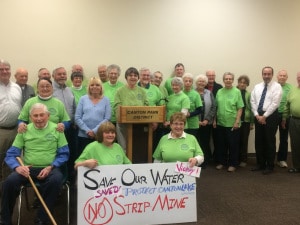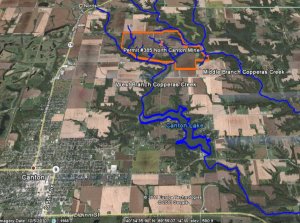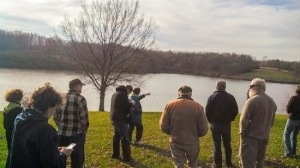 Canton-area residents celebrated yesterday after winning an eight-year battle to halt the proposed North Canton coal strip mine – successfully protecting Fulton County communities and their right to clean water. On January 16th Capital Resources Development Company, LLC asked the Illinois Department of Natural Resources (Illinois DNR) to withdraw its permit application for the mine, which has been challenged by the local community since 2007.
Canton-area residents celebrated yesterday after winning an eight-year battle to halt the proposed North Canton coal strip mine – successfully protecting Fulton County communities and their right to clean water. On January 16th Capital Resources Development Company, LLC asked the Illinois Department of Natural Resources (Illinois DNR) to withdraw its permit application for the mine, which has been challenged by the local community since 2007.
The strip mine, authorized twice by the Illinois DNR, would have polluted Canton Lake, endangering the drinking water supply for more than 20,000 local residents. Residents also cited a long list of other threats to local resources and quality of life posed by the mine that were inadequately addressed through the agency’s review process.
The hard-fought victory by the committed members and supporters of Canton Area Citizens for Environmental Issues is a testament to the power communities have when they stand together to assert their basic rights. The successful effort to block the strip mine will undoubtedly serve as an inspiration to those facing similar threats across the state.
Polluting a Public Water Supply
 The North Canton Strip Mine would have been the first strip mine in the state allowed to discharge pollution into a public water supply. While many would expect community resources like Canton Lake to be a top priority for water protection, the state-issued permit authorized the strip mine just over a mile upstream, compromising the drinking water for over half of Fulton County’s residents and placing an undue burden on the Canton water treatment plant and local tax payers.
The North Canton Strip Mine would have been the first strip mine in the state allowed to discharge pollution into a public water supply. While many would expect community resources like Canton Lake to be a top priority for water protection, the state-issued permit authorized the strip mine just over a mile upstream, compromising the drinking water for over half of Fulton County’s residents and placing an undue burden on the Canton water treatment plant and local tax payers.
An Irresponsible Operator
The mining company is an affiliate of Springfield Coal Company LLC, a notorious rogue operator that has racked up hundreds of violations at other sites for illegal and dangerous water pollution.
Over the course of just 8 years at the Industry Mine in Schuyler and McDonough counties, the owners of the mining company violated their water pollution permit over 600 times.
A Lengthy Legal Battle – Funded by Bake Sales
Permit No. 385 was originally issued in 2008. The appeal to this decision launched by local residents went through five years of review before an agency official finally handed down an order in 2013 denying the permit, stating that it failed to correctly identify and protect a branch of the Copperas Creek, a tributary to Canton Lake dismissed as “Ravine 6” by Capital Resources, as an “intermittent stream.”
With the permit ostensibly “denied,” the community was surprised to learn soon after that Illinois DNR’s permitting staff interpreted the ruling as only denying the permit in part – asserting that the rest of the permit had been approved, but needed some revisions.
Illinois DNR went on to issue a revised mining permit in July 2013, in spite of flagrant violations at the company’s other mine sites – prompting another legal challenge by the community and Heart of Illinois Sierra Club group.
On the eve of a court hearing on this second permit challenge, and in the face of continued staunch local opposition, Capital Resources finally asked the agency to withdraw the permit application – ending the life of permit No. 385.
The operator never had the chance to mine the site, in part because they never received a water pollution permit from the Illinois EPA. Prairie Rivers Network partnered with the Illinois Chapter of the Sierra Club to challenge this permit, drawing on our experience with pollution violations at the parent company’s Industry Mine.
Because Canton area residents were unable to rely on state regulators to do their jobs, they were forced to hire expert witnesses and legal counsel, funded through bake sales and garage sales, to see that state mining laws were implemented properly.
Mine Permit System Concerns – Fixing the Problems
The fact that the Illinois DNR authorized a strip mine a mile upstream of a public water supply to a company with extensive ongoing pollution violations raises grave concerns about the cozy relationship between state regulators and the coal industry.
Moving forward, Prairie Rivers Network will continue to work alongside our partners in the call for transparency and accountability for the coal mining industry and state mining regulators. With clearer definitions for streams and wetlands that agency staff adhere to, communities facing the impacts of coal extraction can expect higher protections for their watersheds.
Years of violations at Springfield Coal Company mines also highlight the need for stronger enforcement practices. Permit applications from repeated bad actors (or close corporate “affiliates”) should not be granted or renewed – doing so presents a clear danger to the surrounding community’s health and miners’ safety.
Agencies granting permits also have the opportunity to go to greater lengths to consider the impacts of mining on the local land and hydrology – North Canton presenting a clear example with the risks to a public water supply.
Finally, the engaged citizens of Fulton County illustrate the need for a permitting process that is accessible to local residents. Making documents searchable and available allows residents with local knowledge to protect their land and water (in this case, identifying a branch of the Copperas Creek as more than a “ravine”).
Canton Lake Protected

There is no doubt that the North Canton permit should have received more scrutiny from the very beginning. Instead, Canton residents had to wage an eight-year battle to prove to the state that coal mines don’t belong next to drinking water supplies.
Thanks to the tireless efforts of Canton Area Citizens for Environmental Issues, an important piece of Fulton County has been successfully protected for fishing, hiking, boating, and the provision of safe drinking water for years to come.







